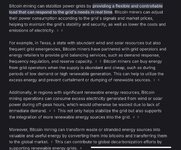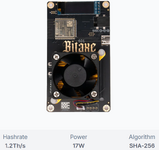Bitcoin fixes thisJust a friendly reminder. If you are in Spain right now your BTC is worth zero. Just a shot over the bow test run (like Covid) and a sign of things to come. Remember, you can't eat money.
View attachment 20466

Bitcoin fixes thisJust a friendly reminder. If you are in Spain right now your BTC is worth zero. Just a shot over the bow test run (like Covid) and a sign of things to come. Remember, you can't eat money.
View attachment 20466

I dont think they know what happened or maybe it was intentional from the government, they will most likely blame it on climate changeWas it a green energy thing with some atmospheric condition that messed it all up?
The future for a lot of Europe is bad; real bad.
TLDR: electrical grids must be perfectly balanced between energy produced and energy used. Excess electricity on the grid will increase the AC frequency to the point of damaging grid infrastructure and collapsing the grid, sometimes for days or even weeks. More demand will decrease the frequency leading to brownouts, again causing damage to somponents unless demand is forcibly reduced (blackouts).
As a result, about 50% of all electricity produced is wasted, shunted to underground heat sinks, in order to always produce enough energy for peak demand for a given day. Power generation capacity is not instantly variable (a nuclear plant takes days to go from off to full power). Power demand IS instant and immediate, therefore excess electricity must always be produced, usually for the peak 2 hours per day, for all 24 hours, even though 60%+ of that electricity is not needed, and most importantly unable to be sold at any price.
Bitcoin mining is the only industrial electric load that is variable from 0 - 100% with no downsides. You can’t shut down a car factory, and traditional variable loads like steel mills can only shut off for a few hours at most.
Electricity prices go down for all customers, because that 50% base load that was unsold and being converted to heat underground, can now be sold to a customer that will use as much or as little as can be sold at a specific rate. A buyer of last resort.
I happened to be in that part of Europe when the power went off and guess what fiat currency also wasnt available, ATMs off, you couldnt access your banking app either, I had some cash but most shops and restaurants closed their doors during the power outages, there was a Pakistani shop that let us go in to buy stuff cash thats about it, so if there was not power and internet, basically all money would be useless, bitcoin would still be safe because if you leave the country and go to another country it would still work, not so with fiat currency.This completely misses the point. There are numerous reasons a grid may fail, that go beyond excess power capacity, and once a grid fails bitcoin is worthless.
Only those with cash and gold will have any buying power. If the grid goes out for years, then the bitcoin will fall to zero.
Bitcoin is linked to an inherently fragile system and is one of many reasons it is an extreme risk asset. Never invest more than you can afford to lose.
bitcoin would still be safe because if you leave the country and go to another country it would still work, not so with fiat currency.
Cash is good to have I agree but it wont last you long its just for emergencies or if you need to flee the country.If a power goes out in your country, you won't be able to hop on a plane and travel somewhere to cash out your bitcoin. It could be months before you're able to liquidate any holdings. Travel without power is a real pain, and very slow (even with a car - where do you stop and rest?), and then once in a new country will they let you in? Will there be any bitcoin exchanges that accept foreigners? Lot of things that can wrong in a disaster situation.
Cash on hand and gold are the only failsafe options.
Like analyst said, diversification.If the power grid is off all over the world for years I think everyone would be in trouble not just bitcoin people and yes its a good idea to have some cash on hand for emergencies I think its a good idea.
No, guns/ammo/cigarettes/booze. Goldbugs lose again.Cash on hand and gold are the only failsafe options.
Even smart guys in our midst have no real understanding of EV.If the power goes out permanently in a country I think you would have far bigger problems than worrying about your bitcoin, you would need to focus on water, hunting, fishing, defense, survival until order is restored.
I have this one running 24/7 on bookshelf:I don't know if this has been discussed here but have any of you had experience with or know someone who has mined Bitcoin? I know the cost of energy varies regionally but I want to try to assess electricity costs associated with BTC mining and of course the mining device itself. Electricity cost in my region of the Mid-Atlantic is very reasonable all things considered. What kind of investment would those of us who want to start out with a lower to mid level device be looking at?

This is categorically false. I have no idea where you heard something so patently absurd, or how someone as intelligent as yourself could believe it and then repeat it here as fact. But this is basically on the same level as saying that the moon is made of cheese.As a result, about 50% of all electricity produced is wasted, shunted to underground heat sinks, in order to always produce enough energy for peak demand for a given day.
I know someone in South Africa who mines Bitcoin, he said the problem is our electricity is too expensive here but he has the various miners connected to the solar and windmill system that also powers his house, his miners make quite a racket so he had them shut in his out buildings, so fortunately for him he needs the solar to run his house anyway and we have lots of sunshine so he makes use of the extra electricity generated, its use it or lose it.I don't know if this has been discussed here but have any of you had experience with or know someone who has mined Bitcoin? I know the cost of energy varies regionally but I want to try to assess electricity costs associated with BTC mining and of course the mining device itself. Electricity cost in my region of the Mid-Atlantic is very reasonable all things considered. What kind of investment would those of us who want to start out with a lower to mid level device be looking at?
You are right, not all excess capacity is converted to heat in dump loads, and my sentence was misleading. Variable production and gas peaker plants do increase the cost compared to running cheaper plants like nuclear and coal, and having a responsive demand for excess base load decreases total production costs.This is categorically false. I have no idea where you heard something so patently absurd, or how someone as intelligent as yourself could believe it and then repeat it here as fact. But this is basically on the same level as saying that the moon is made of cheese.
Power is generated and consumed in real time, this is true, but the only losses are those associated with the physical operation of the grid itself as electricity flows through it. Every foot of conductor results in minute losses due to electrical impedance, and there are further losses due to capacitance and inductance, which produce non-productive reactive power, but which are necessary to maintain voltage support. But there are no "underground heat sinks" absorbing 50% of all electricity produced at any given time.
This is the simple explanation for how power generation and load are balanced in real-time. The process is well-understood and has been successfully employed worldwide for longer than anyone on this forum has been alive. System frequency is closely monitored, and generation units are simply sped up or slowed down as needed to maintain the desired 60 Hz. Power consumption in a given area tends to follow extremely predictable patterns based on the time of day and year, and grid operators know when additional generation units need to be brought online to meet demand. That's it. There is no need to shunt 50% of power generated to ground, because balancing generation and load is not a particularly challenging endeavor (although renewables like solar and wind add a new layer of difficulty to load balancing, and the over-reliance on them is what produced the recent debacle in Spain).
LIVE FREE!
